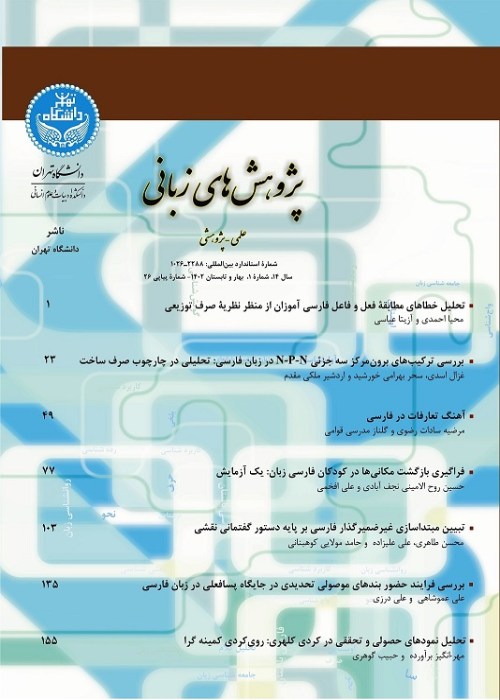Acquisition of Functional Categories in English as a Second Language
Author(s):
Abstract:
Second Language Acquisition (SLA) always happens when the learners live and have contact with the native speakers of a second language. Although this study investigates learning English by ten native children of Farsi, the authors try to simulate the second language acquisition environment. The research deals with the initial state and further development in the child second language learning of syntax regarding the presence or absence of functional categories, as well as the role and the degree of L1 influence in this regard. Some studies in the field of child L1 acquisition are discussed to determine similarities or differences between child L1 and child L2 acquisition. The competing claims of the two most prominent hypotheses about early L2 grammars, i.e. Vainikka & Young-Scholten’s (1996) Minimal Trees/Structure Building hypothesis and Schwartz & Sprouse’s (1996) Full Transfer/Full Access hypothesis, are tested. The conclusion is reached that functional categories are absent at the initial state and that they emerge without the learners’ reliance on their L1, consistent with Minimal Trees/Structure Building hypothesis.
Keywords:
Language:
Persian
Published:
Language Research, Volume:3 Issue: 2, 2013
Page:
95
magiran.com/p1132642
دانلود و مطالعه متن این مقاله با یکی از روشهای زیر امکان پذیر است:
اشتراک شخصی
با عضویت و پرداخت آنلاین حق اشتراک یکساله به مبلغ 1,390,000ريال میتوانید 70 عنوان مطلب دانلود کنید!
اشتراک سازمانی
به کتابخانه دانشگاه یا محل کار خود پیشنهاد کنید تا اشتراک سازمانی این پایگاه را برای دسترسی نامحدود همه کاربران به متن مطالب تهیه نمایند!
توجه!
- حق عضویت دریافتی صرف حمایت از نشریات عضو و نگهداری، تکمیل و توسعه مگیران میشود.
- پرداخت حق اشتراک و دانلود مقالات اجازه بازنشر آن در سایر رسانههای چاپی و دیجیتال را به کاربر نمیدهد.
In order to view content subscription is required
Personal subscription
Subscribe magiran.com for 70 € euros via PayPal and download 70 articles during a year.
Organization subscription
Please contact us to subscribe your university or library for unlimited access!


